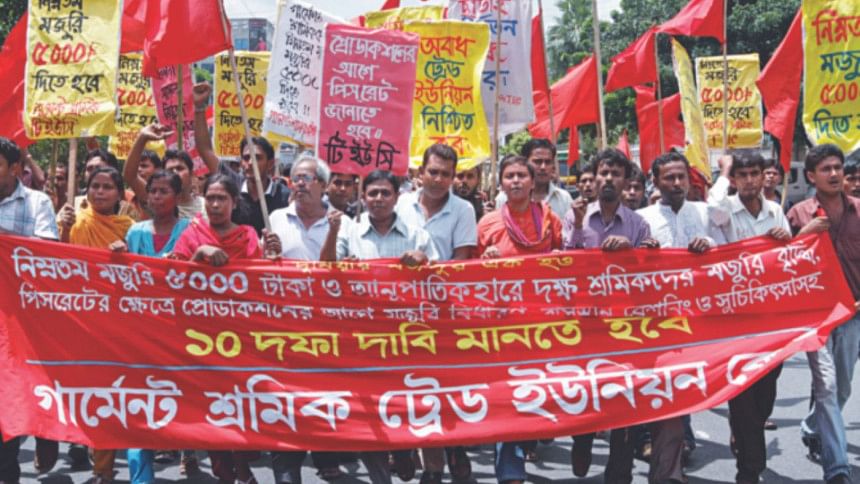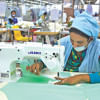What can be done?

I hear from union leaders, labour law advocates and "garments owners". Unfortunately, I heard different versions of what's going on in the field. The important point is that while I do not expect them to always speak in unison, the current discord is not healthy for industrial growth and economic progress of Bangladesh. If we are going to achieve middle income status by 2021 and join the club of rich countries by 2041, as Bangladesh Industries Minister Amir Hossain Amu reiterated last week in Boston, it is imperative that: a) we all speak in the same voice in the arena of labour and management relations; and b) the government and industrial leaders must be serious about playing by the rules of the game.
What does the data show? There has been some growth in the number of unions while the number of registered unions has almost doubled in the last three years. While we can take pride in these achievements, last month on the occasion of the third anniversary of the Rana Plaza disaster, I also read headlines such as "Remove obstacles to trade union in RMG industry", which echoes the sentiments of the Human Rights Watch. The picture that emerges is not very encouraging. ILO's Solidarity Center reports that the Directorate of Labour, in 2015 and 2016, rejected the application for registering unions at a fast clip - at a 73 percent rate to be precise. I also watched a webinar where a union organiser at one of the biggest telecom operators in Bangladesh complained that four years have passed since filing of the application, but the registration is still pending. Reports also abound about different tricks used to harass, discourage and disenfranchise the union movement.
While we observed the National Occupational Safety Hazard Day with pride on April 28, progress in various fronts in ensuring workers' safety has been slow. On January 2, 2016, The Daily Star reported that "workplace deaths increased last year". In 2015, 93 of the 373 deaths reported by the Safety and Rights Society occurred in garments, plastics and ship breaking industries. While training of the newly recruited Labour Inspectors who will support the efforts to improve working conditions and labour safety in Bangladesh is under way, it is still a far cry from effective enforcement. Vigilant workers, including trade unions, can play a vital role in promoting the interest of health and safety. Other areas for improvement are collective bargaining, establishing a public database for factory inspection reports, and healthy industrial relations.
I wonder why the government and its bureaucrats would sit by idly when we are not only being harangued by foreign governments and our trading partners in the EU and the US about lax enforcement of labour laws and safety standards in the RMG sector, but also paying a hefty penalty for them? In a seminar organised by the International Sustainable Development Institute (ISDI) at Harvard University last year, Trade Minister of Bangladesh Tofail Ahmed assured the world that Bangladesh had met all the conditions set out in the action plan when our GSP was revoked, and implored US government officials from the Congress, the Office of Trade Representative, and the State Department to ensure that the country is granted reduced tariffs for its RMG products. Similarly, last week, the country's Industries Minster made a strong case for foreign investment (FDI) in Bangladesh, citing the favourable "investment climate" and "protection of labour rights". These assertions are in sharp contrast to the case filed by the International Trade Union Confederation (ITUC) with the International Labour Organisation (ILO), which among other issues, detailed "how the government … sought the dissolution of existing unions and stood idly by when factory management have engaged in union-busting in contravention of the Bangladesh Labour Act and criminal law."
For Bangladesh, it is now time to reflect on the road we have ahead of us, and the challenges that we need to face and address in order to develop a healthy workforce on the march to a middle-income status for our country. Let there be no doubt that we need to have robust trade union activities in the RMG industry, not only to meet the stipulations of our clients, but also to ensure that our workers are engaged and feel a sense of ownership to this surge in industrial growth and rapid development of the country. While it has been a bumpy road till date, things have to move faster - all parties must strive to arrive at a consensus and make quick and healthy unionisation our goal. If Bangladesh wishes to genuinely take pride in its exemplary investment climate and a hospitable FDI environment, our endeavours should target not only infrastructure, ICT sector, and law and order situation, but also make an honest effort to remove various administrative bottlenecks that impede timely reviews of license applications, whether in the setting up of factories or registering of trade unions.
The writer is an economist and author of Economics is Fun: Short Essays for the Masses.

 For all latest news, follow The Daily Star's Google News channel.
For all latest news, follow The Daily Star's Google News channel. 






Comments